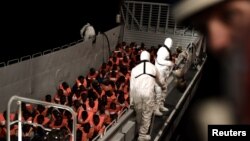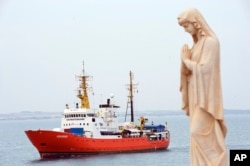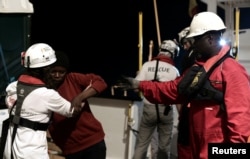Italy prepared Tuesday to ship hundreds of migrants to Spain after barring them from entering its own ports in a surprising effort to pressure Europe to share the responsibility of accommodating some of the newcomers.
French President Emmanuel Macron denounced Italy's new populist government, maintaining it was required by international law to take in the migrants, who are mainly from sub-Sahara Africa.
"There is a degree of cynicism and irresponsibility in the Italian government's behavior with regards to his dramatic humanitarian situation," Macron told his Cabinet, according to government spokesman Benjamin Griveaux.
The French rebuke highlights tensions within the European Union over how to handle the years-old migration crisis. While Italy has taken in more than 640,000 migrants over the past five years, other EU nations have largely ignored appeals from Rome to accommodate some of the migrants.
Italy's Deputy Prime Minister Luigi Di Maio dismissed France's criticism, saying, "It is rich coming from them."
Italy dispatched two ships Tuesday to help transport the 629 migrants, including 11 children and at least six pregnant women, to Spain, which unexpectedly volunteered Monday to take in the group.
The migrants, who were picked up off the Libyan coast last weekend, have been stuck on the rescue ship Aquarius in international waters off the coast of Italy and Malta, which also denied them entry.
Doctors Without Borders, which operates the Aquarius along with the SOS Mediterranee, said the migrants were "exhausted and stressed" and warned of severe health risks to some passengers during the 1,500 kilometer journey.
The Aquarius is overcrowded, so the four-day trip to Spain, in what is expected to be bad weather, will be particularly perilous.
To help overcome the problems, two Italian boats approached the Aquarius to take on some of the migrants before heading west through what are expected to be stormy seas.
Italy's new interior minister and head of the far-right League, Matteo Salvini, said his actions this week are designed to force other European countries to share the burdens presented by the ongoing influx of migrants.







